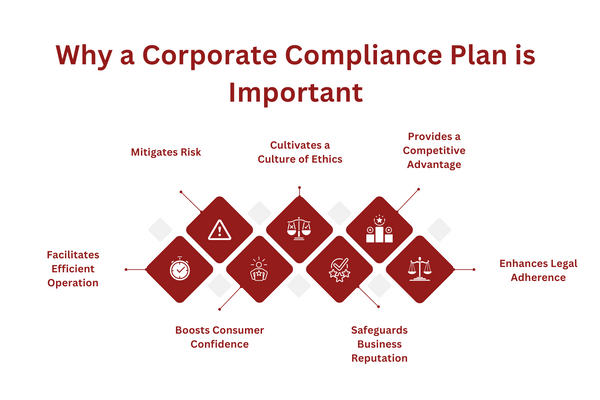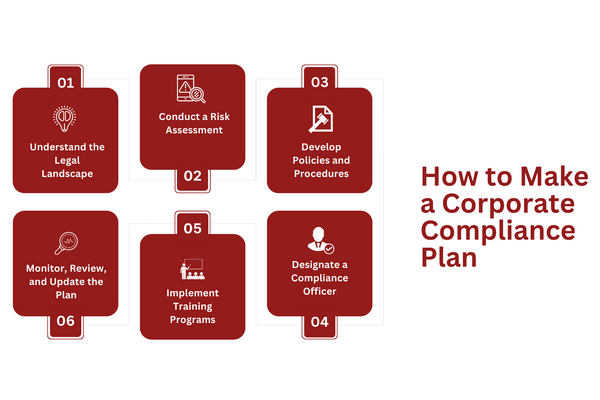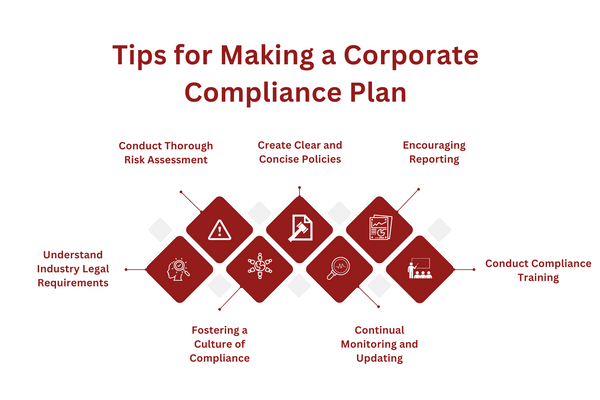
Let us help develop and build your Corporate Compliance Plan. A top tier plan must prioritize data privacy, driven by a complex and fragmenting global regulatory landscape, with multiple new U.S. state laws taking effect and new changes each year that we track. These mandates increase consumer rights—including the ability to access, correct, delete, and opt-out of the sale of personal data and targeted advertising—while also expanding the definition and protection of sensitive personal information. Consequently, a robust compliance strategy requires continuous data mapping, mandatory Data Protection Assessments (DPAs) for high-risk processing (especially involving AI), enhanced vendor risk management, and rigorous data security practices like strong access controls. Ultimately, a successful 2025 compliance plan shifts data privacy from a mere legal requirement to a core, transparent business function focused on building and maintaining customer trust.
In today’s complex and constantly changing business environment, a corporate compliance plan serves as the backbone of the business’s operational structure.
This article will provide an in-depth analysis of what a corporate compliance plan is, its importance, how to create one, its key elements, common challenges, and ways to overcome them.
What is a Corporate Compliance Plan?

A corporate compliance plan is a detailed program outlining a business’s policies, procedures, and actions to help it comply with legal, ethical, and industry standards.
It is a proactive strategy designed to prevent, detect, and correct any deviations that may jeopardize the business’s credibility, legal standing, or reputation.
Corporate compliance signifies a business’s commitment to abide by applicable laws, regulations, and internal policies. This includes areas like financial reporting, employment practices, data protection, and consumer relations.
A robust corporate compliance plan signifies the business’s dedication to ethical practices, securing its standing in the business world.
Why a Corporate Compliance Plan is Important

A corporate compliance plan acts as the ethical and legal compass of the business. It not only safeguards the business from potential legal pitfalls but also helps build a reputation of trust and integrity, which is paramount to success in any industry.
Here’s why having a corporate compliance plan is beneficial and important for any business:
Enhances Legal Adherence
An effective corporate compliance program ensures that businesses stay updated and compliant with all relevant laws, regulations, and standards. This helps them avoid any legal issues or penalties. This not only prevents financial losses but also protects the business’s reputation.
Safeguards Business Reputation
In an era of increasing transparency and accountability, maintaining a positive business reputation is critical. A good reputation can go a long way, and a bad one can prevent a lot of future business.
A well-implemented corporate compliance plan can help businesses demonstrate their commitment to ethical conduct and corporate responsibility, thereby bolstering their reputation.
Boosts Consumer Confidence
A corporate compliance plan shows the business’s dedication to fair business practices, thereby increasing trust among consumers. This enhanced confidence can translate into increased consumer loyalty and improved business performance.
Facilitates Efficient Operation
A comprehensive compliance plan can streamline operational processes by clearly defining policies and procedures for various business functions.
This not only boosts operational efficiency but also ensures that all team members are on the same page about the business’s compliance expectations.
Mitigates Risk
One of the main goals of a corporate compliance program is to identify, manage, and mitigate risks. This proactive approach can help businesses anticipate and prevent potential compliance issues, thereby reducing the likelihood of legal sanctions or reputational damage.
Cultivates a Culture of Ethics
A corporate compliance plan can help foster a culture of ethics and compliance within the business. This encourages employees to act responsibly and ethically, thereby minimizing the chance of misconduct.
Provides a Competitive Advantage
A robust corporate compliance plan can give businesses a competitive advantage. Many consumers, investors, and partners prefer businesses that demonstrate a commitment to compliance, making it an attractive selling point.
How to Make a Corporate Compliance Plan

Creating a corporate compliance plan requires careful consideration, strategic planning, and focused execution. Here are the steps to develop an effective plan:
Understand the Legal Landscape
Begin by understanding all the applicable laws, regulations, and industry standards relevant to your business. This may require legal expertise or consultation compliance services.
Conduct a Risk Assessment
Identify potential risks that could lead to non-compliance. This could include anything from employee misconduct to data breaches. Prioritize these risks based on their potential impact on the business.
Develop Policies and Procedures
Once the risks have been identified, develop clear policies and procedures to address them. These should be practical, enforceable, and aligned with your business’s goals and values.
Designate a Compliance Officer
Choose an individual or team responsible for implementing the corporate compliance plan. This could be an internal employee or an outsourced compliance officer.
Implement Training Programs
Ensure all employees understand their roles and responsibilities under the compliance plan. This can be achieved through regular corporate compliance training sessions.
Monitor, Review, and Update the Plan
Regularly monitor the implementation of the plan, conduct compliance audits, and make necessary changes based on the feedback and changing legal or business environment.
Tips for Making a Corporate Compliance Plan
Tips for Making a Corporate Compliance Plan.png

Crafting an effective corporate compliance plan can be a complex task, often with many hurdles. Understanding common challenges and learning how to navigate them can make the process more manageable and increase the success of your compliance efforts.
Here are a few tips and potential pitfalls to be aware of while developing your corporate compliance plan:
Understand Industry Legal Requirements
Compliance is largely about adhering to legal standards and regulations, but understanding these can be a challenge.
Laws vary by industry and location, and they often change. It’s important to establish a system to stay updated on these changes and interpret them correctly. Legal counsel can be invaluable in this regard.
Conduct a Thorough Risk Assessment
Risk assessment is a vital part of the process, but it can be challenging to identify all potential areas of risk.
A good corporate compliance plan should include regular risk assessments to ensure potential problems are identified early and dealt with effectively.
Regularly review and update your risk assessment to ensure it reflects the current operations and potential risks in your business.
Create Clear and Concise Policies
The foundation of an effective corporate compliance plan is clear, comprehensive policies that outline expected behaviors and procedures.
Developing policies that are comprehensive yet easy to understand can be tricky. The language used should be clear, and the policies should cover all areas of the business. Employees are more likely to adhere to rules they understand.
Encouraging Reporting
Employees should feel comfortable reporting potential compliance issues. This requires an open and transparent culture that encourages reporting and protects employees from retaliation.
Conduct Compliance Training
The most comprehensive compliance program won’t be effective if your employees don’t understand or aren’t aware of it.
Regular compliance training that is engaging and easy to understand can be beneficial. Training should be tailored to different roles within the business for maximum effectiveness.
Employees should understand not only what is expected of them but also why it’s important.
Continual Monitoring and Updating
Compliance is not a one-time activity but a continuous process. Regular monitoring and auditing of your compliance program are vital to ensure its effectiveness.
It’s equally important to update the program regularly to keep it aligned with any changes in regulations or business operations.
This often involves regular compliance audits to identify areas for improvement.
Fostering a Culture of Compliance
Compliance should not just be about avoiding penalties but should be ingrained in the business culture. Getting buy-in from top management and promoting an environment where employees feel comfortable reporting issues are crucial for a successful compliance program.
FAQs
What is the Purpose of a Corporate Compliance Plan?
The purpose of corporate compliance programs is to prevent, detect, and correct potential regulatory violations within a business. This is achieved through implementing clear policies, training employees, and monitoring compliance.
How Often Should a Risk Assessment be Conducted?
Risk assessments should be conducted regularly, at least once a year. However, businesses should also conduct additional assessments when significant changes occur in the business or regulatory environment.
What is the Role of a Compliance Officer?
The compliance officer is responsible for developing, implementing, and overseeing the corporate compliance plan. They also act as a point of contact for compliance issues and drive the culture of compliance within the business.
What Does a Compliance Audit Involve?
A compliance audit involves a systematic review of the business ’s adherence to regulatory guidelines. It examines policies, procedures, documentation, and practices to ensure the business is in compliance with laws and regulations.
Can Outsourced Compliance be Effective?
Yes, outsourcing can be an effective way to handle compliance, especially for smaller businesses that lack the resources to maintain a dedicated in-house compliance team. Compliance solutions provided by external experts can provide comprehensive, up-to-date knowledge and resources.
Closing
Don’t let the complexities of compliance intimidate you. With the right resources and strategy, you can safeguard your business from potential risks and elevate its reputation. Should you opt for in-house management or consider outsourced compliance options, the value of a robust compliance plan remains indispensable.
If you’re ready to take the next step in protecting your business against risks and regulatory pitfalls, reach out to Captain Compliance today.
Let us help you navigate the path to compliance, providing tools, guidance, and support tailored to your business’s unique needs. Let’s turn compliance from a daunting challenge into a strategic asset.Contact us now to get started!